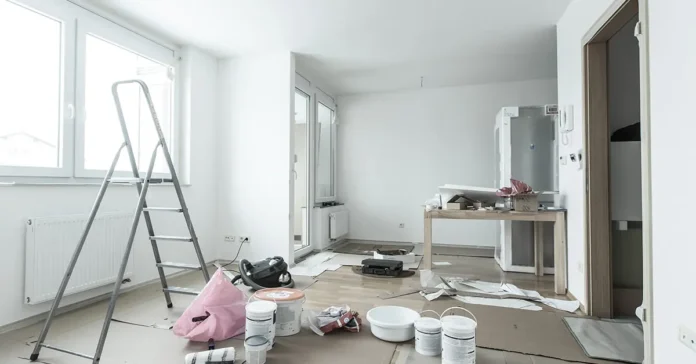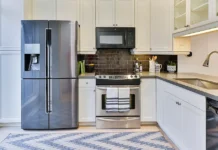Home Renovation Tips – In this user-friendly handbook, we’ll navigate the process together, providing you with practical and accessible tips to ensure the security of your belongings throughout the renovation. From fragile decor items to the valuables, we’ll explore various storage solutions, protective measures, and easy-to-implement strategies.
Your belongings deserve the utmost care, and this guide is your go-to companion for a secure and successful home renovation journey. Dust and debris can cause irreparable harm to your possessions during a house renovation, so it’s essential to take the necessary precautions and protect belongings during home renovation.
Home Renovation Tips – Choose Self Storage
It is no secret that renovations can be extremely messy. Whether it is insulation debris, drywall dust, or paint splatter, your space will become very dirty and may stay dirty for a while. To keep your belongings clean and safe from being bumped into or knocked over by workers, it may be best to move them offsite and into a self-storage unit. Even a simple paint job can end up ruining costly furniture, art pieces, and linen if you do not have the right plan in place to save them. Finding a storage space to stow away your possessions is the best way to go.
Why Self Storage?
There are several reasons why you should choose to put your stuff away in a self-storage unit. The number one reason is reducing your stress. Through the course of the renovation, you will be interacting with several people, answering various queries, making impromptu decisions, and revising design plans. This can all be quite stressful and overwhelming. Packing up your items and putting them in a safe and secure location like a self-storage unit will ease your mind because it offers you:
- Assured Security
A self-storage unit is a secure space. Once you have put your goods in storage you can rest assured that they will be safe and free from damage during renovation.
- 24/7 Surveillance
As part of the 24-hour security, storage facilities come equipped with CCTV cameras that ensure intruders stay away. Furthermore, 24-hour surveillance means that if there is a fire or any unforeseen structural damage, it will be noticed at once. Damage control will commence immediately.
- Customised Storage Space
You can pick a storage space that is the perfect size for your goods. Self-storage units come in varying sizes because not everyone requires the same space. If your renovation is restricted to just one room of your house, you may not have too many items to store, hence you can pick a space with dimensions that suit your needs. Someone renovating their whole house might need much bigger storage space, even two individual units.
- Flexible Lease
In case your project takes much longer than expected you can always extend the lease on the storage unit. Once the renovation is complete, you can still choose to maintain the storage unit, taking home only those possessions that you absolutely need.
- Privacy
Self-storage helps you maintain privacy. A renovation project entails several strangers (like the plumber, electrician, painter, HVAC technician, installers, etc.) working around your home. Not everyone is comfortable opening their doors and baring all. You can shift your costly possessions and personal items quite discreetly to a storage unit. If the items you want to put away are legal and come with necessary licences and permits, a storage unit is the safest, most private place you can find.
- Accessibility
Besides being a secure location to store your goods, the storage facility also gives you 24/7 access. This means that you can check on your goods and add or take away objects at any time of the day.
Preparing your Belongings for Self-Storage
1. Declutter your Home
Take this opportunity to declutter your house. Often, we have more than we need and do not even realise it. There might be a stack of old newspapers at the back of a shelf or a creaky chair that we never use. Toys and board games that the kids have stopped using might be taking up a lot of space too. Pick the items that have sentimental value and the ones that are expensive to put in storage. Give away or sell the other unwanted stuff. This way your home becomes neater, and you will need to rent out a smaller storage unit. Make a comprehensive list of items that you want to put away in storage and what needs to be given away.
2. Take Inventory
The first step is to make a list of all the goods are getting in the way of your renovation project and must hence be put away in storage. You can also add to this list personal belongings that you would like to keep away from strangers. This list will also enable you to understand what objects you need and what you can get rid of. This will help you declutter your home as well.
3. Assess Space Requirements
Once you have made your final list of goods for storage, you can now decide on how much storage space you need. If you are unable to decide, you must call the storage expert. He will come over to your house, go through your inventory, make measurements of the objects, and then advise you on how much storage space you need. You can then rent out a storage space whose dimensions suit your requirement. Since you will be charged according to the size of the unit, getting one that is the right fit for your possessions is important.
4. Choose the Right Type of Storage Unit
Finding the right space for storage is important. The whole purpose of putting your belongings in storage is for them to be safe and your mind to be at ease, so you could focus on the renovation. Here are some points to consider while scouting for a storage facility:
- The place should have security personnel and CCTV cameras 24/7.
- The place should have ample lighting and every unit needs to be suitably ventilated.
- It should be easily accessible at any time of the day.
- You should have the option to rent a space that is exactly right for your possessions.
- In case you are storing perishables, the facility should have a refrigerator.
- When storing electrical and electronic goods check with the facility manager about temperature control and ventilation to ensure the goods remain in working condition.
5. Pack your Possessions
When moving your belongings to a storage unit, they need to be properly packed. You must not pile things up in a cardboard box and head off to the storage facility. This could cause damage to your goods and cost you a lot more to fix. While the use of a self-storage facility for a renovation project is temporary and simple, you will still be moving and storing valuable items through the process. For this reason, it is still important to pack the items to prevent damage:
Home Renovation Tips for Kitchen/ Dining room
Glassware should be wrapped in bubble wrap and stored in appropriate containers, with extra padding to make sure shifting in the box is minimal. Appliances should be thoroughly defrosted and cleaned, with any cords properly coiled and tied for safety. We recommend climate-controlled storage and bubble wrap on the appliances for extra precaution as well.
Home Renovation Tips for Bedrooms
Mattresses should be covered and protected during storage. Beds should be disassembled, and the headboards protected by cardboard or bubble wrap. Mirrors and other wall hangings should be protected by cardboard and stored upright. Bed linens, curtains, small rugs, and clothes should be stored in plastic containers and labelled carefully.
Home Renovation Tips for Living/Family Rooms
TVs and other expensive electronics should be wrapped in bubble wrap, with cardboard guarding the screens, in a climate-controlled storage unit. Large furniture items should be stored or stacked with care to avoid toppling and fabrics should be wrapped in plastic. Large area rugs should be rolled, never folded, for storage.
Once you have your possessions packed and stored away, you will have more working room around your house. When the contractor and crew arrive, they will be able to move around freely, unhampered by furniture and other items. They will need room to work and store supplies and materials. By moving your displaced belongings into a self-storage unit your contractors will have the extra space to work in. They can be more efficient onsite and get the work done at a quicker pace.
After the renovation is done and the builders have cleaned up and left, the empty space will act as a blank canvas. You get the amazing opportunity to see your space empty to envision what you want your new space to look like, without your furniture and belongings getting in the way. This can help you better organize your room, declutter further, and determine what you need all the time in the house, and what you only need seasonally. You can continue to rent the self-storage unit for the items you do not need right away.
Home Renovation Tips – Do’s & Dont’s
- Set a Realistic Deadline
There are a lot of things that can delay the completion of a renovation project, so it is important to remain flexible with the completion date. Chances are things will change as the project is ongoing, or there may be delays with deliveries or a spell of poor weather that will cause the project to go more slowly. Just remember that a good construction job takes time, so be patient.
- Set a Budget and Stick to It
The key to a successful project is knowing how much you can realistically afford to spend to achieve the results you want. It is a clever idea to discuss this with your designer, architect, or builder, as they will be able to advise you on where savings can be made. Try to stick to your allocated budget as much as possible, but it is good to have a contingency budget too, in case anything unexpected crops up.
- Protect your Belongings
Do not overlook this key step. Dust and debris from renovations are inevitable. While the contractors will attempt to mitigate the mess by spreading plastic sheets on the floor and furniture, they could still get damaged. Pack them up and send them off to storage for safekeeping.
- Do Not Pick a Cheap Contractor
While it may seem cost-effective to book a team of workers who charge less, cost alone is not sufficient when picking labour. When looking for contractors, you should do some groundwork. Look up a few possibilities and do a background check. Make sure you properly vet your contractors by looking at reviews and recommendations. If your friends or family can make a first-hand recommendation, check out their work and hire them.
- Do Not let the Contractor or Builder Override your Decisions
They have the expertise but that does not mean they can just go ahead and redesign without your consent. If they make suggestions that are valid in terms of safety, then get them to work with your interior designer for any rework or changes. Only upon your approval can the new design be put into action.
Final Words on Home Renovation Tips
Remember that a successful home transformation is not just about changing the look but creating a space that feels like you. These tips, tailored for simplicity and practicality, empower you to start your renovation journey with confidence. From protecting belongings to choosing the right colors, the key is to enjoy the process and let your personality shine.
As you navigate the exciting path of home improvement, consider each step as a chance to make your space uniquely yours. So, roll up your sleeves, unleash your creativity, and let these tips be your companions in crafting a home that reflects not just a renovation, but a true expression of you. Happy renovating!
FAQs
A: Belongings are safeguarded to prevent damage during the renovation process, ensuring a smooth and stress-free transformation.
A: Prioritize safety by following expert tips, using proper tools, and adhering to safety guidelines to minimize risks during the renovation.
A; Yes, consider factors like room size, lighting, and personal preferences to choose colors that complement your space and create the desired ambiance.
A: Infuse personal style by adding unique decor items, choosing colors you love, and integrating elements that reflect your personality and preferences.
A: Effectively manage your budget by prioritizing essential projects, obtaining multiple quotes, and planning for potential unexpected expenses.
A: Yes, start with small, manageable projects, seek guidance from professionals, and gradually build your skills and confidence in home renovation.
A: Planning in advance helps streamline the renovation, prevents delays, and ensures a more organized and efficient transformation of your living space.
A: Embrace eco-friendly practices by using sustainable materials, recycling, and choosing energy-efficient appliances to reduce environmental impact during the renovation.
A: Yes, renovate on a budget by prioritizing essential projects, exploring cost-effective materials, and considering DIY options for certain tasks.
A: Manage stress by setting realistic expectations, taking breaks, and seeking support from professionals to navigate challenges.







